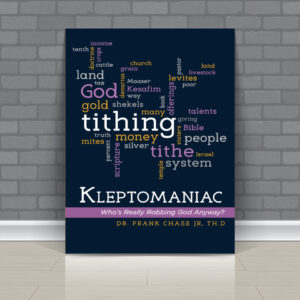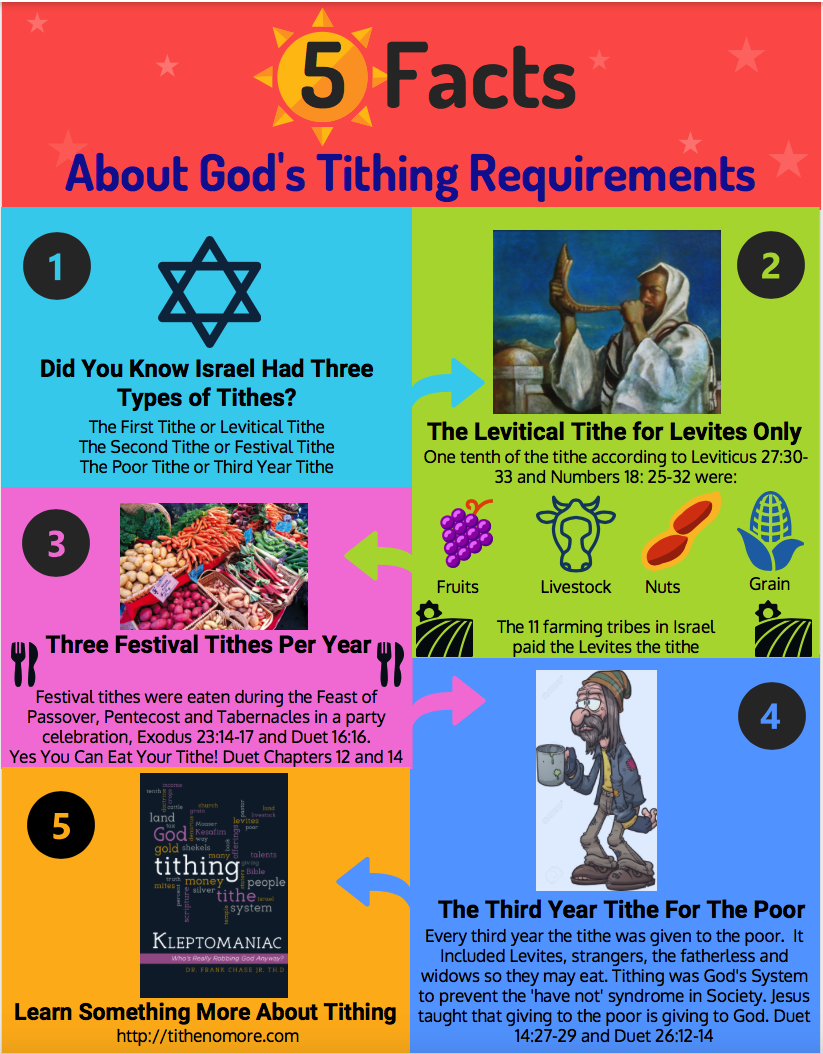 For most people tithing is traditionally interpreted as money taken from a paycheck and handed over to a religious person or institution as payment because of a supposed command from Yahweh has been the biggest Ponzi scheme in human history . And the madness doesn’t stop there because some people also think that what is called the church, which is a brick and mortar building that houses people is somehow defined as God’s biblical storehouse.
For most people tithing is traditionally interpreted as money taken from a paycheck and handed over to a religious person or institution as payment because of a supposed command from Yahweh has been the biggest Ponzi scheme in human history . And the madness doesn’t stop there because some people also think that what is called the church, which is a brick and mortar building that houses people is somehow defined as God’s biblical storehouse.
The concept of tithing is often based on private interpretation of scripture and not on context and proper hermeneutics. To that end, when discussions arise about what the Bible interprets as first fruits.

No matter how much the misapplication of monetary tithing has done in the world to help build churches, schools, hospitals, missions, help missionaries, pay ministers, staff and other church expenses, in addition to paying for buses, and electronic and music equipment, Sunday school literature, cribs for nursery, Christmas baskets, and fertilizer for lawns; unsound scriptural tithing doctrine and eisegesis which is private interpretation that imposes one’s own presuppositions and bias by reading into the text what they want they want to interpret cannot justify an out of context meaning of the word tithe. Excerpt From: Dr. Frank Chase, Jr., Th.D. “Kleptomaniac: Who’s Really Robbin God Anyway?” iBooks.

How Was The Modern Financial Tithe Mandatory Tithe Created?
Questioning Tithing is as Forbidden as the Fruit in the Garden of Eden
1. The evolution of Money tithing replaced food tithing through the method of people suspending their common sense to embrace ignorance. “As the Church expanded and various institutions arose, it became necessary to make laws which would insure the proper and permanent support of the clergy. The payment of tithes was adopted from the Old Law… The earliest positive legislation on the subject seems to be contained in the letter of the bishops assembled at Tours in 567 and the [canons] of the Council of Macon in 585.”—The Catholic Encyclopedia.
2. Let’s pull back the curtain of time to examine how this colossal system took a hold since it’s inception.“ The sixth century.
3. The “phrase “to make laws which would insure the proper and permanent support of the clergy.” The mighty Holy Roman Catholic Church created man-made laws to permanently support clergy. These laws were not from the Bible. They slowly over the centuries began a systematic campaign to eliminate FOOD as the Tithe to replace it with Money (How do we know? They are the richest Organization in the World) and to build cathedrals throughout Europe in many empires which many now stand empty or are nothing but museums.
4. When they created the financial tithe, they had to ensure it would remain permanent so they had to justify it with Scripture out of context and enforce it with Church decrees, using threats of hell fire, and fear to maintain the money coming in for generations. Fear tithing is much more profitable than free-will giving.
5. God never gave the church permission to change what he required as a tithe to what man requires and then turn around and lie on God and say he commanded at ten percent of gross income in perpatuity from church members . The church cannot commute the biblical tithe to money and the Clergy can only ask the congregation to help pay the bills only by asking for generous giving not monetary tithing.
The Church Began Very Early to Rape Its Members Financially

False Tithing Statements Refuted
- All Christians who don’t tithe are under a curse. This is a fear tactic and it is not true!
A. The Bible says in Gal 3:13, “But Christ rescued us from the Law’s curse, when he became a curse in our place.” (The Learning Bible). Now explain how a preacher or anyone else can put a curse on you when Christ already paid with his life. There is no curse for not tithing. The cures man puts on you is witchcraft. 2.All Christians should give until it hurts and God will bless you. God does not say this at all.
2. All Christians should give until it hurts and God will bless you. God does not say this at all.
B. The Bible says in 2 Cor 8:12-13, “It doesn’t matter how much you have. What matters is how much you are willing to give from what you have. I am not trying to make life easier for others by making life harder for you (The Learning Bible). The KJV says in verse 12 “For if there be first willing mind, it is accepted according to that a man hath and not according to that he hath not.” The Jewish Bible says in verse 12, “For if the eagerness to give is there, the acceptability of the gift will be measured by what you have, not by what you don’t have.” Now explain how a preacher or anyone else can tell you give until it hurts when Paul made it clear that giving is based on what you have, your eagerness and will only be accepted by God under certain circumstances. Look at the verses, if you give beyond what you have, it will not be accepted by God. What an amazing statement by Paul. Giving until it hurts is a violation of scripture. When you give in hurting mode, you are no longer willing and then what you give is not acceptable. NEVER GIVE UNTIL IT HURTS BECAUSE LIKE PAUL SAID HE WOULD NEVER MAKE LIFE HARDER FOR YOU AND EASIER FOR OTHERS IN GIVING. According to Jewish tradition, giving until it hurts, is putting oneself into Tzedaka, which is strictly forbidden. Giving until you are in need of charity is violating TORAH.
Tithing Explanation in Dollars and Crops
Sometimes in an effort to help people understand tithing you have to give simple examples and even in that it can still be hard to break through the indoctrination. Everybody know the word tithe means tenth part, but question is, a tenth part of what. Is it money or something else according to scripture. If the Hebrew word for tithe is Ma’aser and translates to everything edible according to the Jewish Historian Josephus, then how did the word tithe become so corrupted that no one can believe it has an authentic original meaning based on scripture, exegesis, hermeneutics and the land, language and literature of the Hebrew culture. So this blog is basically establishing the tithe are not money but food, let me break down what a tithe in Israel would look like. The biblical tithing system in its authentic totality is counterintuitive to most people are not Hebrew. So let me say, that tithing in the Bible was practiced by the farmers from 11 tribes in Israel. “If two farmers had crops of 10 carrots each, they would both be obligated to tithe on carrot. Under the law or Moses, it didn’t matter if one sold the other 9 carrots for $5 each [$45] and the other sold his remaining 9 carrots for $10 each [$90]. The tithe of the harvest was unrelated to the income of the harvest. Plain and simple, the tithe was not 10% of one’s income; it was 10% of one’s harvest. To be truly biblical, tithing was not based on income or money at all!” (Clever Lies and Assumptions from the Pulpit to the Pews, F.L. Anderson, page 61, ©2009) The tithe in the Bible that God approved is land and production based and never income based.
For decades in the church has heard pastors read this verse in Mathew 22:17-21: Tell us therefore, What thinkest thou? Is it lawful to give tribute unto Caesar, or not? 18 But Jesus perceived their wickedness, and said, Why tempt ye me, ye hypocrites?19 Shew me the tribute money. And they brought unto him a penny. 20 And he saith unto them, Whose is this image and superscription? 21 They say unto him, Caesar’s. Then saith he unto them, Render therefore unto Caesar the things which are Caesar’s; and unto God the things that are God’s. The cunning argument that pastors make is the last point Jesus makes about Rendering unto Caesar that which belongs to Caesar. Pastors rightly say the tax money belong to Caesar, but then go on to say, “if the taxes or tribute belong to Caesar then what do you think belongs to God since Jesus said render unto God that which belongs to God. They herald from the pulpit that the tithe belongs to God. However, that is not what Jesus implied at all! Because of lack of understanding the context, the audience Jesus was speaking to and the hebrew language, error ensures either on purpose or from ignorance. Here is the truth about what belongs to God. The logic and the argument Jesus was making is that Caesar made the coins and stamped his image on them, so they belonged to him; but since God made humanity and stamped his image on us, then we belong to God, by rendering ourselves unto him. In essence, Jesus was making an alter call. Now that is powerful because the image on the coins are the same whether there was one or one-thousand! The image of God stamped on humanity is in the millions and all of humanity looks different. This verse has nothing to do with monetary tithing. The land based agricultural and livestock tithe has alway been what belonged to God through the Levites. (Listening to the Language of the Bible by Lois Tverberg and Bruce Okkema, EnGedi Resource Center, page 56, ©2004, 2006). The money tithe argument in Mathew chapter 22 falls apart on two grounds: The tithe went directly to the Levites not the Temple for support. Second, The argument (Render unto God the Things that are God’s supports monetary tithes) falls apart because the tithe was not a tax, it was an inheritance package for the Levites by birthright not for the temple. Tithes were a substitute inheritance for land. The Levites were given a three part inheritance package that consisted of tithes (Num.18:21, 24) , offerings (Duet 18:1), and 48 Cities plus 3000 feet of pasture land (Numbers 35:1-8). To further illustrate Ravi Zacharias in one of his teachings points out that in the same way as the coin has Caesars image and inscription on it, the unasked or follow-up question is….”Who (or what) is made in God’s image and has His inscription on him?”….”Who (or what) should be rendered to God”. Clearly the answer is Man. This means that we are to render ourselves to God.

Revisiting The Supposed Smoking Gun In Malachi Chapter 3
Malachi 3:8-11 says: Will a man rob God? Yet ye have robbed me. But ye say, Wherein have we robbed thee? In tithes and offerings. 9 Ye are cursed with a curse: for ye have robbed me, even this whole nation. 10 Bring ye all the tithes into the storehouse, that there may be meat in mine house, and prove me now herewith, saith the LORD of hosts, if I will not open you the windows of heaven, and pour you out a blessing, that there shall not be room enough to receive it. 11 And I will rebuke the devourer for your sakes, and he shall not destroy the fruits of your ground; neither shall your vine cast her fruit before the time in the field, saith the LORD of hosts. KJV
1. This verse is used to erroneously scare more people out of 10 percent of their gross or net income than any verse in the Bible Today. One problem exist from the start is, what preacher is right, the one who says, 10 percent of gross or ten percent of net. So there is no consistency from the start based on different teachings.
2. The second problem is that for hundreds of years since the 6th century, the Christian church of all denominations have not succeed in 15 centuries to convince Christians that Tithing money works as taught. Even today in America, the number of Christians tithing is in single digit percentage.
3. The third problem with the net, gross tithing teaching is that, many people who do tithe don’t get a wind fall blessing as taught and some remain poor their entire lives after tithing faithfully for years, while other seem to be getting blessed. Is God Showing partiality?
4. The forth problem is that Most Christians have not studied the tithe from the Hebrew/Jewish perspective in context to find out if what is taught today matches what the OT (TORAH) teaches. Now let’s break apart Malachi by doing word studies to find out what the tithe is and what God was saying to the Jewish people.
5. First, once you read Malachi, you must establish who the audience is that God is speaking too. It is clear he is talking to the Jews. The gentiles would know nothing of the Jewish law of tithing unless they were proselytes to Judaism.
6. Tithe means: a tenth part of something. Doesn’t a tenth part has to come from something whole? But what is the something that “tithes” is referring to in Malachi? The Hebrew words are MASSER and ASER. MASSER is a noun. A noun is the name of a person, place or thing. So if “MA’ASER is a noun then the first time God identifies the noun content is in Leviticus 27:30, 32 which says And all the tithe of the land, whether of the seed of the land or of the fruit of the tree, is the LORD’s. It is holy to the LORD. And concerning the tithe of the herd or the flock, of whatever passes under the rod, the tenth one shall be holy to the LORD. NKJVC.
7. The thing God identifies is not a place, not a person, but a thing. The thing or the noun that is identified as a tithe (Ma’aser) is a tithe (tenth part) from seed from the ground or fruit from trees (crops). Then God identifies the tithe from herds and flocks. God never identifies silver gold or any form of money as a mandatory tithe.



Recent Comments